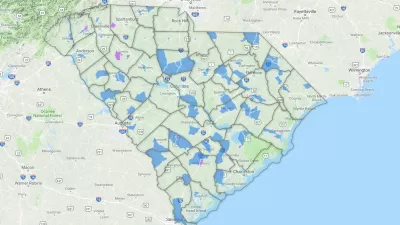A big day for developers as the Treasure Department paved the way for an anticipated $100 billion in private investment in underserved communities.

"The Treasury Department on Friday released its first round of rules and guidance on the federal Opportunity Zones program, which was created in the tax cut bill passed by Congress last year and uses large capital gains tax breaks to incentivize investment into designated low-income areas," reports Joe Sonka.
"While there is one final round of federal guidance for the program expected before the end of the year, a number of groups invested in the outcome of Opportunity Zones hailed last week’s rules for providing clarity on what type of investments would qualify for the tax break, and allowing flexibility for how and when such investments must be deployed into development and business projects," adds Sonka.
After the announcement of the new guidance from the Treasury Department, observers on either side of the aisle had less than enthusiastic responses to the newly revealed details of the program. Writing for the Center for American Progress, Olugbenga Ajilore argued that the program ignores low-income communities in favor of the wealthy and corporations. Writing for the Washington Examiner, Colin Wilhelm seems included to agree, claiming that the Treasury Department's guidance is a clear win for the real estate industry, with much less clear benefits for low-income Americans.
For more background, see previous Planetizen coverage of the Opportunity Zones program.
FULL STORY: Treasury releases first round of rules on Opportunity Zones, giving flexibility to developers

Alabama: Trump Terminates Settlements for Black Communities Harmed By Raw Sewage
Trump deemed the landmark civil rights agreement “illegal DEI and environmental justice policy.”

Study: Maui’s Plan to Convert Vacation Rentals to Long-Term Housing Could Cause Nearly $1 Billion Economic Loss
The plan would reduce visitor accommodation by 25% resulting in 1,900 jobs lost.

Planetizen Federal Action Tracker
A weekly monitor of how Trump’s orders and actions are impacting planners and planning in America.

Waymo Gets Permission to Map SF’s Market Street
If allowed to operate on the traffic-restricted street, Waymo’s autonomous taxis would have a leg up over ride-hailing competitors — and counter the city’s efforts to grow bike and pedestrian on the thoroughfare.

Parklet Symposium Highlights the Success of Shared Spaces
Parklets got a boost during the Covid-19 pandemic, when the concept was translated to outdoor dining programs that offered restaurants a lifeline during the shutdown.

Federal Homelessness Agency Places Entire Staff on Leave
The U.S. Interagency Council on Homelessness is the only federal agency dedicated to preventing and ending homelessness.
Urban Design for Planners 1: Software Tools
This six-course series explores essential urban design concepts using open source software and equips planners with the tools they need to participate fully in the urban design process.
Planning for Universal Design
Learn the tools for implementing Universal Design in planning regulations.
Caltrans
Smith Gee Studio
Institute for Housing and Urban Development Studies (IHS)
City of Grandview
Harvard GSD Executive Education
Toledo-Lucas County Plan Commissions
Salt Lake City
NYU Wagner Graduate School of Public Service





























